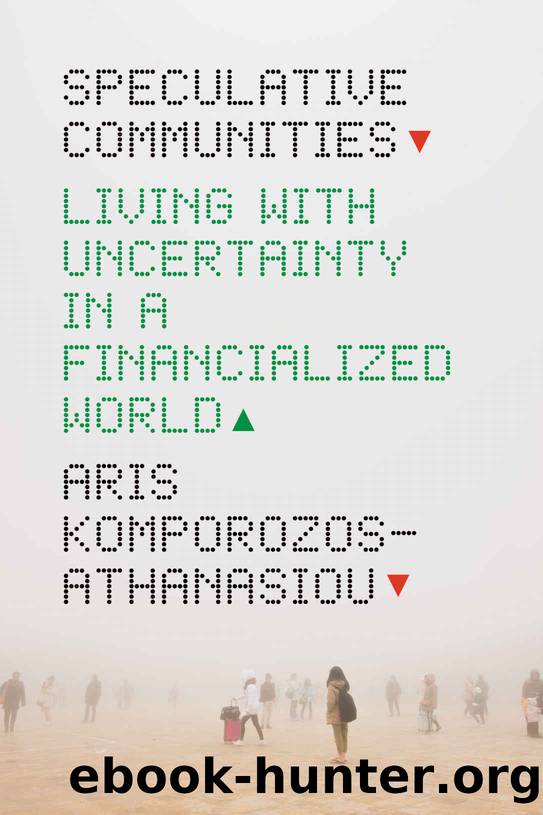Speculative Communities: Living With Uncertainty in a Financialized World by Aris Komporozos-Athanasiou

Author:Aris Komporozos-Athanasiou [Komporozos-Athanasiou, Aris]
Language: eng
Format: epub
Tags: Business & Economics, General, Free Enterprise & Capitalism, Economic Conditions, Consumer Behavior, BUS022000 Business & Economics / Economic Conditions, BUS016000 Business & Economics / Consumer Behavior, BUS000000 Business & Economics / General, BUS029000 Business & Economics / Free Enterprise
ISBN: 9780226713274
Google: CJdHzgEACAAJ
Amazon: 022671327X
Goodreads: 57331807
Publisher: University of Chicago Press
Published: 2022-01-17T08:00:00+00:00
Explanations of the Paradox: Polanyi and Crowd Psychology
Explanations of the paradox of converging global finance and neopopulism often follow the logic of what Karl Polanyi, the noted economic historian, described as âdouble movement.â In his pivotal work The Great Transformation, Polanyi (1944) cataloged the history of capitalism from 1830s England to its global crisis in the 1930s, proposing that the movement toward unabated marketization of the political sphere precipitates a counter-movement of protectionism and nationalism in response. The double movement both anticipated and sought to explain the rise of fascism and war (which was ongoing at the time of writing The Great Transformation). A committed social democrat, Polanyi sought to explain the dominance as well as the renewal of capitalist ideology in two key stages (movements) that are repeated historically: a âdisembeddingâ of the economy from social life (followed, importantly, by the separation of economy from polity) through market deregulation and commodification, and the â(re)embeddingâ of markets within society, through government intervention, regulation, and decommodification. The disembedding movement occurs as money, labor, and land are treated âas ifâ they were commoditiesâwhat Polanyi terms âfictitious commoditiesââthus making societies more vulnerable to the speculative fancies of capital. The re-embedding response is seen as a counter-movement, playing the crucial role of keeping market expansion âin check.â This is how society protects itself âagainst the perils inherent in a self-regulating market systemâ (Polanyi 1944, 80).
But the double movement is also underpinned by a view of transformative social change in which a participatory demos is instrumental in overturning âreified marketsâ (Thomasberger 2005). This view, along with Polanyiâs explicit concern with the fate of democracy in the aftermath of fascism, helps explain why his work has regained popularity during the nationalist fallout from the 2008 crisis. Counter-movements are considered necessary for providing a sense of security for the future and a politics of redistribution against the ravages of unregulated markets. The government-provided protection and social insurance marshaled by the New Deal (after the Great Depression) are examples of this historical function of the double movementâand so are, by the same token, state interventions such as the controversial bailouts of US and European banks ensuing from the 2008 global financial crisis.
Counter-movements historically have emerged from a diverse set of constituencies that included âworkers, peasants, industrialists and landowning elites,â who mobilized to demand national restrictions on markets (Goodwin 2018, 1271). But the kind of counter-movement that Polanyi himself favored was international. Anticipating a new global financial regime, he advocated a framework that would foster market regulation and social provision by democratic welfare states. Polanyi was interested in the longue durée of the tensions built within capitalist dynamics rather than in how temporary diversions may become absorbed by it (Peck 2013). His work thus strove to be sensitive to the complex and permanent struggles between traditional and modern forms of capitalism, avoiding a short-sighted view of markets as the (sole) cause of political individuation. One of the most noteworthy implications of the double-movement theory, then, is its view of
Download
This site does not store any files on its server. We only index and link to content provided by other sites. Please contact the content providers to delete copyright contents if any and email us, we'll remove relevant links or contents immediately.
International Integration of the Brazilian Economy by Elias C. Grivoyannis(111061)
The Radium Girls by Kate Moore(12030)
Turbulence by E. J. Noyes(8052)
Nudge - Improving Decisions about Health, Wealth, and Happiness by Thaler Sunstein(7709)
The Black Swan by Nassim Nicholas Taleb(7132)
Rich Dad Poor Dad by Robert T. Kiyosaki(6637)
Pioneering Portfolio Management by David F. Swensen(6302)
Man-made Catastrophes and Risk Information Concealment by Dmitry Chernov & Didier Sornette(6020)
Zero to One by Peter Thiel(5802)
Secrecy World by Jake Bernstein(4753)
Millionaire: The Philanderer, Gambler, and Duelist Who Invented Modern Finance by Janet Gleeson(4479)
The Age of Surveillance Capitalism by Shoshana Zuboff(4299)
Skin in the Game by Nassim Nicholas Taleb(4250)
The Money Culture by Michael Lewis(4209)
Bullshit Jobs by David Graeber(4192)
Skin in the Game: Hidden Asymmetries in Daily Life by Nassim Nicholas Taleb(4007)
The Dhandho Investor by Mohnish Pabrai(3767)
The Wisdom of Finance by Mihir Desai(3749)
Blockchain Basics by Daniel Drescher(3583)
